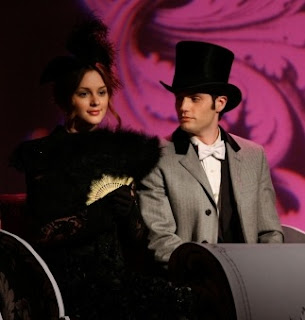Edith Wharton and Gossip Girl
 I don't intend to apologize for liking the television show Gossip Girl,* but I also hope the following does not read like an attempt to elevate it by identifying its debts to Edith Wharton; that would be like trading on the name of one's rich but distant relatives, a move which hasn't happened yet in Gossip Girl, though it would be suited to its universe.
I don't intend to apologize for liking the television show Gossip Girl,* but I also hope the following does not read like an attempt to elevate it by identifying its debts to Edith Wharton; that would be like trading on the name of one's rich but distant relatives, a move which hasn't happened yet in Gossip Girl, though it would be suited to its universe.Naming Wharton as one of Gossip Girl's influences is not particularly original of me; in Season Two, the boys' and girls' private schools of St. Jude and Constance combine to stage a production of The Age of Innocence, and the writers of the show have fun placing their characters in roles from Wharton's novel, ultimately suggesting that these high schoolers actually do live in a Wharton plot, and not just a Whartonian milieu of old money. Minor details also connect the show to House of Mirth: Lily Bass is quite obviously a descendant (by name) of Lily Bart, and the show opens quite cleverly with the very same set-up as the novel: a beautiful young woman walks unexpectedly through Grand Central Station. More minor still (and more tendentious, I allow), is the Rose/Rosedale correspondence (Cyrus Rose, Simon Rosedale) for the only Jewish characters in either work. I believe I noticed more parallels as I was reading House of Mirth, but I can't recall them now.
But more significantly, the principal theme of the show and of the two major Wharton novels (House of Mirth and Age of Innocence) is basically the same: Wharton and the creators of Gossip Girl are fascinated by what keeps people who do, might, or could love each other apart. Gossip Girl is virtually algorithmic in its exploration of this problem: take nine major characters, mix and match. Find each combination's weak point, and relentlessly drive that pair toward it.
Wharton is of course more graceful, but not exactly more subtle; Selden and Lily, Newland and Ellen (and, come to think of it, Ethan Frome and Mattie), are similarly the objects of a ruthless authorial experiment in how two people can find something, anything to keep them apart. It is rather the opposite of the romance plot: instead of overcoming the various obstacles (personality and class or wealth are probably the main ones) which separate the hero and heroine, Wharton and Gossip Girl make the characters' affinities which naturally link the characters into the obstacles which must be surmounted to resolve the plot's tension. It's a rather striking structure, even in series.
* I know nothing about the novels; much of what I say here about the connections between Wharton and the GG show could in fact be a product of the written source material. If anyone is familiar with the novels, I'd be very interested to hear to what extent they reference—explicitly or in code—Wharton. The New Yorker reviewed them, but that's all I have to go on.
Edit 11/20/2010: The new season also has its Wharton reference: the second time we see Juliet, she is reading House of Mirth, and Juliet, like Lily, finds innovative ways of hiding her penury from her rivals. She hasn't started making hats in a millinery yet, though.
Comments